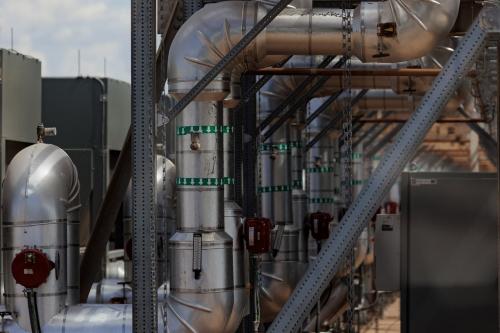The price of crude oil has crashed in the past few months. That’s bad for the clean energy sector, right?
Actually, not necessarily. Not only do falling oil prices have limited impact on clean energy, but the latest price volatility only underscores how unstable petroleum sources remain and so accentuates the value of clean sources.
There are two principal reasons why the clean energy industry will not be swamped by the petroleum glut.
To begin with, while all commodities in the energy industry are to an extent intertwined, oil and renewable energy do not directly compete with each other. Oil is primarily used to produce transportation fuels while renewable energy is used to generate electricity. The International Energy Agency points out that diesel and other petroleum-based fuels constitute only 5 percent of global power generation today compared to 25 percent in 1973. Fluctuations in oil prices, therefore, will have little impact on renewable energy sources like solar, wind and biomass in advanced economies, ensuring that the economic proposition of those resources remains highly compelling in the long run.
Second, over the long run there is an important price difference between energy derived from technology-based sources like solar and wind and that derived from commodity-based sources like coal and oil. Over the long run the cost of energy from the former invariably declines as technology innovation proceeds. For example, a recent energy cost analysis by investment firm Lazard confirms that the cost of energy from utility-scale solar and wind farms has become widely competitive with electricity produced from conventional fuels like coal, natural gas, and nuclear, even without subsidies in some markets—with the cost of utility-scale solar falling 80 percent and wind energy falling 60 percent in the last five years.
On the other hand, commodities-based sources, which are finite and expensive to locate, extract, ship, and refine, are inherently subject to price volatility. While the U.S. shale boom driven by advancements in fracking technology has generated expectations of cheap U.S. gasoline, it is also one of the contributors to the recent volatility in oil prices. And no one knows for sure how long the production boom will last, with the U.S. Energy Information Administration projecting that even under favorable conditions U.S. shale oil production will peak by 2020 and then decline.
To be sure, the oil price crash will cloud the near-term market outlook of a few clean energy technologies such as electric vehicles that do compete with oil-based transportation. However, over the long-term the scale up of EVs too appears inevitable. Oil prices can only go up while most clean energy technologies are only at the beginning of a rapid price decline due to manufacturing and efficiency improvements.
In short, oil prices won’t likely affect renewables and clean energy. On the contrary, last year—when global clean energy investment increased by 16 percent to $310 billion even as oil prices plummeted—proves how strong the clean energy industry really is.
The Brookings Institution is committed to quality, independence, and impact.
We are supported by a diverse array of funders. In line with our values and policies, each Brookings publication represents the sole views of its author(s).



Commentary
Falling Oil Prices Won’t Hurt Clean Energy
January 23, 2015